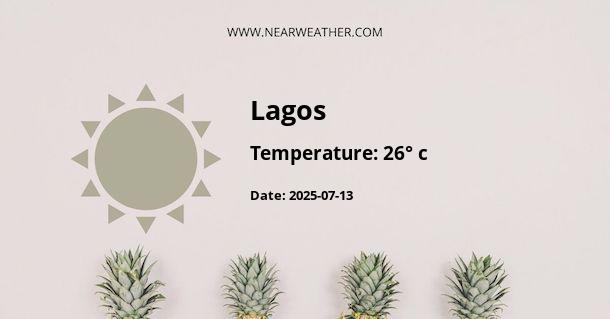Lagos, Nigeria: Climate and Weather Year Round
Lagos, the largest city in Nigeria and one of the fastest-growing cities in Africa, experiences a tropical savanna climate characterized by high temperatures and distinct wet and dry seasons. The city's location near the equator and its proximity to the Atlantic Ocean greatly influence its weather patterns throughout the year.
Temperature
Lagos has a consistently warm climate with relatively high temperatures year round. The average daily temperature ranges from 25°C (77°F) to 32°C (90°F) throughout the year. The hottest months are typically between February and March, with temperatures occasionally reaching 35°C (95°F) or higher. The coolest months are between July and August, when temperatures can drop to around 23°C (73°F) at night.
Due to its coastal location, Lagos benefits from the moderating influence of the Atlantic Ocean, which helps to keep the temperatures from becoming extreme. However, the city does experience occasional heat waves, especially during the dry season.
Rainfall
Lagos has a distinct wet and dry season. The wet season typically lasts from April to October, while the dry season spans from November to March. During the wet season, Lagos receives the majority of its annual rainfall, with heavy downpours and thunderstorms being common occurrences.
The average annual rainfall in Lagos is around 1,900 millimeters (75 inches), with the peak occurring in June and September. The city experiences a decrease in rainfall during the months of July and August, known as the "August break." However, even during this drier period, there can still be occasional showers.
Harmattan Season
In addition to the wet and dry seasons, Lagos experiences a brief period known as the Harmattan season. The Harmattan is a dry and dusty trade wind that blows from the Sahara Desert across West Africa. It typically occurs between late November and early February.
During the Harmattan season, Lagos experiences a significant drop in humidity and an influx of dry and dusty air. Visibility can be reduced due to the haze and dust particles in the atmosphere. The Harmattan winds also bring cooler temperatures, with daytime highs ranging from 26°C (79°F) to 30°C (86°F) and cooler nights.
Climate Variability
Like many other cities around the world, Lagos is also experiencing the effects of climate change. Rising global temperatures and changing weather patterns have resulted in increased frequency and intensity of extreme weather events such as heavy rainfall, flooding, and heatwaves.
These changes pose significant challenges for the city's infrastructure, particularly its drainage systems, as heavy downpours often lead to flooding in low-lying areas. The city has been taking measures to improve its resilience to climate change through initiatives such as urban planning, flood control measures, and public awareness campaigns.
Conclusion
Lagos, Nigeria, has a tropical savanna climate with high temperatures year round. The city experiences distinct wet and dry seasons, with the wet season lasting from April to October and the dry season occurring from November to March. The Harmattan season brings dry and dusty winds from the Sahara Desert between late November and early February. Climate change poses challenges for Lagos, with increased frequency of extreme weather events. Understanding the climate and weather patterns in Lagos is crucial for residents, businesses, and policymakers to make informed decisions and adapt to the changing climate.
A - Lagos's Latitude is 6.453060 & Longitude is 3.395830.
A - Weather in Lagos is 28° today.
A - Climate Conditions in Lagos shows few clouds today.
A - Humidity in Lagos is 83% today.
A - Wind speed in Lagos is 7.42 km/h, flowing at 190° wind direction. today.
